
– 15 – 01 – 2023 –
Second Sunday in Ordinary Time
Gospel reading: John 1:29-34
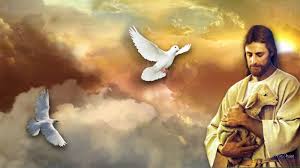 vs.29 Seeing Jesus coming towards him, John said,
vs.29 Seeing Jesus coming towards him, John said,
“Look, there is the lamb of God that takes away the sin of the world.
vs.30 This is the one I spoke of when I said: A man is coming after me who ranks before me because he existed before me.
vs.31 I did not know him myself, and yet it was to reveal him to Israel that I came baptising with water.”
vs.32 John also declared,
“I saw the Spirit coming down on him from heaven like a dove and resting on him.
vs.33 I did not know him myself, but he who sent me to baptise with water had said to me, ‘The man on whom you see the Spirit come down and rest is the one who is going to baptise with the Holy Spirit.’
vs.34 Yes, I have seen and I am the witness that he is the Chosen One of God.”
********************************************
We have Three sets of homily notes to choose from.
Please scroll down the page.
Michel DeVerteuil : A Trinidadian Priest, specialist in Lectio Divina
Thomas O’Loughlin: Prof of Hist Theology, University of Nottingham
John Littleton: Director, Dominican Priory Institute,Tallaght D 24
*******************************************************
Michel de Verteuil
Lectio Divina with the Sunday Gospels – Year A
www.columba.ie
General notes
As happens each year, the lectionary remains with Christmas themes (and with St John’s gospel) for one more week. It is as if the church is still enjoying Christmas and is reluctant to move on to Ordinary Time and St Matthew.
The passage has a double focus: Jesus and John the Baptist. John invites us to “look” at Jesus; and reflects on John’s mission to proclaim Jesus to the world.
We are free to identify with either:
– to celebrate times when some John the Baptist (a person, a word or an event) invites us to take a fresh look at Jesus “coming towards us”;
– to celebrate our mission as parents, teachers, friends, community leaders, spiritual guides to “proclaim” to the world ( and often to ourselves) that those in our care are sacred.
John points to two aspects of Jesus:
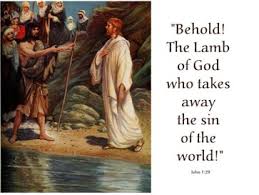 Firstly, He is the lamb of God that takes away the sin of the world (verse 29). We say these words at every Mass, and we have become so accustomed to them that they no longer strike us. We can take the opportunity of this Sunday’s reading to let them come alive for us. We do this in the lectio divina way
Firstly, He is the lamb of God that takes away the sin of the world (verse 29). We say these words at every Mass, and we have become so accustomed to them that they no longer strike us. We can take the opportunity of this Sunday’s reading to let them come alive for us. We do this in the lectio divina way
– linking text and experience and letting each throw light on the other:
– the words help us to appreciate those who have been for us “lambs of God” who “took away” the sin of our community;
– people who have touched our lives help us to understand the words.
Secondly –“He takes away the sin of the world” – states the purpose of the first, so we start with it. It tells us that Jesus is an activist; he does not merely oppose sin in theory, he “takes it away”. He does not accept sin as inevitable, he wages war against it. As individuals and as a church we have tended to water down this aspect of Jesus’ – and our mission:
– we resign ourselves to accepting evil on the grounds that it is inevitable and in any case we are powerless to do anything about it; we say to ourselves – and to others – that this is how life is and we must accept it;
– we “spiritualise” sin, saying things like “we must hate sin but love the sinner”, “we pray for sinners”, “we are all sinners in our own way”, etc. These are all important (and Christian) sentiments, but in practice they are used all too often to cover up the fact that we are not “taking away” some evil in our community.
We celebrate the times when some John the Baptist (a person, an event, a scripture passage) challenged us to “look again” at Jesus “taking away” the sin of the world. By using the singular – “the sin of the world” – the text invites us to identify one particular “sin” which marks our community or culture, e.g. individualism, racism, elitism – maybe our own selfishness. Once we have given it a name, we can celebrate the “lamb of God” who “takes it away”.
Jesus has a distinctive way of “taking away sin”. He does it by being a “lamb of God”. This is another image which we are accustomed to and find difficult to bring to life. We can identify two problems (aside from familiarity):
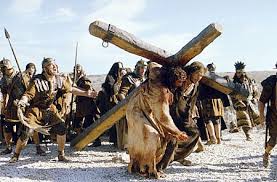 – “Lamb” gives an impression of someone who is passive, someone “meek and mild”. Jesus was not that kind of person, however, and so we need to imagine (from experience) a “lamb” who is powerful and energetic and effectively “takes away” sin from our community. It is a biblical image, not one we are accustomed to using; we may have to turn to other bible texts in order to enter into it.
– “Lamb” gives an impression of someone who is passive, someone “meek and mild”. Jesus was not that kind of person, however, and so we need to imagine (from experience) a “lamb” who is powerful and energetic and effectively “takes away” sin from our community. It is a biblical image, not one we are accustomed to using; we may have to turn to other bible texts in order to enter into it.
The biblical tradition stresses two aspects of the lamb.
First, his blood is shed as a source of life to others. The model is the lamb whose blood was sprinkled on the door posts on the night of the Exodus. Leaders are “lambs” to the extent that they are ready to accept the sufferings involved in leadership. This is not to say that suffering is a value in itself (as Christians have often done); what it tells us is that true leaders do not stand aloof and are not afraid to make themselves vulnerable. They accept the suffering that goes with leadership: being criticised unfairly; being disappointed in people; the occasional failure.
Second, the lamb is not violent. This is well expressed in Isaiah 53:7,
“Harshly dealt with he bore it humbly, he never opened his mouth, like a lamb that is led to the slaughter-house, like a sheep that is dumb before its shearers, never opening his mouth”. Leaders who are “lambs” are prepared to suffer violence against themselves, but refuse to inflict violence on anyone, certainly not on those whom they lead.
1.We must also focus on the words “of God”. Jesus knows himself to be “God’s lamb”; he is self-confident, therefore, not self-pitying, he knows he is secure in the hands of God.
We notice when we “look” at Jesus is that God’s Spirit “comes down on him from heaven and rests on him” so that he can be “baptised with the Spirit” (verses 32 and 33b).
The coming of the Spirit on Jesus (and on his followers) has two effects:
– he has a sense of himself; he does not get his identity from being a leader;
– he knows he is loved; he does not depend on the love of the people he leads.
2. John shares some reflections on his mission to proclaim Jesus.
We can identify four sayings which help us to understand our own mission to “proclaim” those in our care (see above):
a) “He comes after me but he ranks before me because he existed before me.” There are times when we feel awe before the people we minister to. Even if they “come after us” in the sense that they depend on our assistance, we know that in another sense they “existed before us”, i.e. that there is a divine spark within them.
b) “I did not know him and yet it was to reveal him to Israel that I came baptising with water.” We understand only gradually the greatness of the people in our care. We do not “know” them and yet God send them into our lives so that we can “reveal” their greatness.
c) “He who sent me to baptise with water said: the man on whom you see the Spirit come down and rest is the one who is going to baptise with the Holy Spirit.” We are not ready to minister to people until the voice of God (conscience) tells us that we will see the Spirit come down on them and realise that they will “baptise with the Holy Spirit”, i.e. complete what we have done for them. We think of the moment when parents realise that their children will do greater things than themselves.
d) “I have seen and I am the witness, he is the chosen one of God.” It is not enough to say with our lips that someone is sacred; we must “see and bear witness” that this is the chosen one of God.
Prayer reflection
“The death of a single human being is too heavy a price to pay 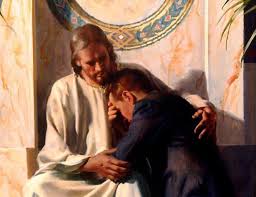 for the vindication of any principle, however sacred.” ….Dan Berrigan
for the vindication of any principle, however sacred.” ….Dan Berrigan
Lord, forgive us for thinking that you want us to destroy people in order to take away some evil from our community.
Send us John the Baptists who will tell us to focus on the Jesus among us who takes away the sin of the world not through violence but as your precious lamb.
Lord, we thank you for church leaders
who affirm the message of Jesus with conviction
so that people can have the experience of John the Baptist,
see Jesus coming into their community and say,
“Look, there is the Lamb of God who takes away the sin of our world.”
“The Word of God is red-hot iron. And you who preach it, you’d go picking it up with a pair of tongs lest you burn yourself.” …George Bernanos, ‘Diary of a Country Priest”
Lord, forgive us that we are afraid of being like Jesus,
lambs led to the slaughter house as we take away the sins of the world.
Lord, forgive us that as leaders we look to the members of our community
to give us our identity so that we cannot risk being unpopular by telling the truth.
Send us John the Baptist to remind us of the day when your Spirit came down from heaven and rested on us.
“A time will come when we will once again be called so to utter the Word of God that the world will be changed and renewed by it. It will be a new language, perhaps quite non-religious, but liberating and redeeming.” …….Dietrich Bonhoeffer
Lord, we pray that your church will be truly John the Baptist saying to the world,
“Look, there is the Lamb of God who transforms the world by taking away its sins.”
“The old man repeats the prayers he recited as a child, but now with the experience of a lifetime.” …Hegel
Lord, we thank you that today we can look back on our lives and say like John the Baptist, “Yes, I have seen, and I am the witness that Jesus is your Chosen One.”
“He is the unseen seer, the unheard hearer, the unthought thinker, the unknown knower. There is no other seer than he, no other hearer than he, no other thinker than he, no other knower than he...The Upanishads
Lord, fill us with a spirit of awe in our ministry.
When we minister to others help us to remember
that though they come after us they rank before us
because there is something within them which existed before us.
“To understand the Scriptures we must stop acting like mere spectators.” …Karl Barth
Lord, send us John the Baptist to remind us that we must see and be witnesses
that your Spirit came down from heaven and rested on the sacred Writers and that the Bible is your Chosen Book.
“I don’t like that man; I have to get to know him better.” ….Abraham Lincoln
Lord, teach us to wait for one another.
When we don’t know people, say to us as you said to John the Baptist,
That we will see the Spirit come down from heaven and rest on them
And discover in them the capacity to complete what we have done,
Baptising with the Holy Spirit where we only baptise with water.
**************************************************
Thomas O’Loughlin
Liturgical Resources for the Year of Matthew
www.columba.ie
Introduction to the Celebration
We gather here each Sunday to encounter one another and to encounter the Chosen One of the Father. We are, as St Paul tells us, ‘the holy people of Jesus Christ, who are called to take their place among all the saints everywhere who pray to our Lord Jesus Christ’. So let us reflect on who we are as a group and on how we have become this holy people through our baptism.
Rite of Penance
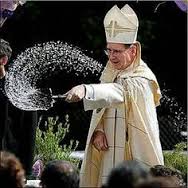 Given the baptismal story in today’s gospel, this is a day when the ‘Asperges’ (Sprinkling of water) option is particularly appropriate.
Given the baptismal story in today’s gospel, this is a day when the ‘Asperges’ (Sprinkling of water) option is particularly appropriate.
Lord Jesus, you are the Chosen One of God. Lord have mercy. Lord Jesus, you are the man on whom the Spirit has come down and rests. Christ have mercy.
Lord Jesus, you are the Lamb of God who takes away the sin of the world. Lord have mercy.
Homily notes
1. Every day we hear of further research into global warming and of new symptoms of the ecological crisis of the planet. This often provokes a cry that religion has little to offer on this problem or that it is a matter that little interests the churches. It is as well to acknowledge this criticism in that there has been a tradition of exploitation of the planet in the industry-driven west – the slash and burn mentality – that has taken Gen 1:28 (‘fill the earth and subdue it’) literally. Equally, many traditions of Christianity have been so centred on the spiritual life of the human being that they have neglected the creation, the environment, and even our bodily material natures. There are plenty at examples at dualist spiritualities that saw humans as souls trapped and held down by matter. And, there are indeed many forms of Evangelical Christianity that sees the message of Jesus so restrictedly in terms of the salvation of individuals or the rescuing of an elect prior to an apocalyptic crunch that they think care for the planet is a waste of time. This produced a certain kind of mechanistic providence: if God wants us to survive, we’ll survive!
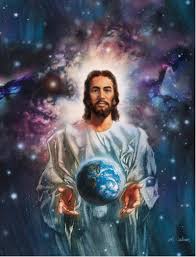 2. However, a healthy theology of the incarnation and a healthy ecology should go hand in hand. If God is the creator of all that is, seen and unseen, and has entered the creation as a creature, the man Jesus of Nazareth, then his love for the creation can know no bounds and should set the standard for our properly ordered interaction with all creatures: visible and invisible, rational or non-rational, animate or inanimate. But the challenge is to have both a healthy christology and a healthy ecology, and have the two interfacing one another.
2. However, a healthy theology of the incarnation and a healthy ecology should go hand in hand. If God is the creator of all that is, seen and unseen, and has entered the creation as a creature, the man Jesus of Nazareth, then his love for the creation can know no bounds and should set the standard for our properly ordered interaction with all creatures: visible and invisible, rational or non-rational, animate or inanimate. But the challenge is to have both a healthy christology and a healthy ecology, and have the two interfacing one another.
3. In the second reading and gospel today – and it is worth pointing out that such occasional overlaps are accidental we have a theology of incarnation which presents the holiness of God entering the creation and then being contagious, spreading out to all nations, out to the very ends of the earth. We tend to think of the earth as just there, raw earth, and then there are distinct special holy places and holy people. But to those who believe in Jesus as the Son of God who comes from the Father and upon whom the Spirit remains, such limited notions of holiness are now inadequate.
Jesus challenges us to a have a whole new way of looking at the world: holiness is now contagious, and everywhere can be a sacred place and everyone can be a saint. We have encountered the Christ, and this challenges us to transform all our relationships. Everyone who is in Christ is a holy person and can spread holiness, everywhere can be a place where we can encounter the presence of God.
4. We must respect each other and the environment as a gift from God and react appropriately to its God-given nature. We cannot see it as just something that we can selfishly hijack as if it were just there. We tend to live in dualist universes: there is the sacred and the secular; the spiritual and the material; the holy and the unholy; the pure and the impure; the saints and the sinners. The love and holiness of God that became part of the creation in Jesus overcame all these dualisms and division. Holiness is contagious, goodness is diffusive, and care for the planet, care for the poor and oppressed, and care for self cannot be separated.
John the Baptist had the task of bearing witness to the incarnate Son among humanity; we have the task of bearing witness to its implications for how we treat the environment.
***********************************
John Litteton
Journeying through the Year of Matthew
www.Columba.ie
Gospel Reflection
Two central characters, Jesus and John the Baptist, dominate the opening chapter of John’s Gospel. (The gospel was written by John the Apostle and Evangelist, not to be confused with John the Baptist who features in the gospel.) The chapter reveals the essential aspects of Jesus’ identity. He is the Word made flesh and the Lamb of God. Both are crucial for an understanding of who he is and what he does.
The first of the characters is Jesus. In the chapter, John the Baptist is quoted as having made one of the most remarkable professions of faith that is recorded in the New Testament. During his preaching, on seeing Jesus in the distance, he said to his listeners:
‘Look, there is the lamb of God that takes away the sin of the world’ (Jn 1:29).
But John’s profession of faith did not stop with that affirmation of Jesus. He elaborated further and then concluded:
‘Yes, I have seen and I am the witness that he is the Chosen One of God’ (Jn 1:24).
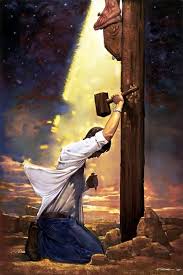 The Baptist’s reference to Jesus as the Lamb of God brings to mind several images. Like other people of that time, the Baptist would have been familiar with the prophecies about the future Messiah, so he could have been referring to the suffering servant of the Lord in chapter 53 of the Book of Isaiah, where the servant was presented as the one who himself would bring salvation to God’s people by bearing their sufferings and sorrows.
The Baptist’s reference to Jesus as the Lamb of God brings to mind several images. Like other people of that time, the Baptist would have been familiar with the prophecies about the future Messiah, so he could have been referring to the suffering servant of the Lord in chapter 53 of the Book of Isaiah, where the servant was presented as the one who himself would bring salvation to God’s people by bearing their sufferings and sorrows.
In addition, there the servant was compared to a lamb being led to the slaughter house. So Jesus’ identity could be understood in that context. The first chapter of John’s Gospel focuses on the fulfilment of the Old Testament prophecies, all of which prepare for the Incarnation: the Word of God made flesh in Jesus.
The Baptist undoubtedly would also have been referring to the paschal lamb in chapter 12 of the Book of Exodus, who had effectively saved the Israelites from annihilation at the time of their escape from slavery in Egypt.
And the Baptist would have been referring too to the story of Abraham’s binding of his son, Isaac, in chapter 22 of the Book of Genesis, where God provided the sacrificial lamb thereby saving Isaac from death. The Baptist, who had long been preparing to announce the Messiah’s arrival, would have had all these scripture passages in mind when referring to Jesus as the Lamb of God.
It is clear that John the Baptist had a definite understanding of Jesus’ identity by using the image of the lamb. Jesus would be the one to destroy sin and thus bring salvation to the world. The Baptist wanted to make clear the distinction between the Saviour and himself, whose task was to prepare the people for the great saving work of Jesus.
In that context, we are reminded of the words spoken by the priest before the distribution of Holy Communion at Mass: ‘This is the Lamb of God who takes away the sins of the world. Happy are those who are called to his supper.’ We remember the details of the apparition of Our Lady at Knock in Ireland, where the central figure in the apparition was the Lamb of God, the innocent victim suffering for our sins, at the altar surrounded by angels, with Mary, Saint Joseph and Saint John the Evangelist prayerfully looking on.
Thus the second character in chapter 1 of John’s Gospel is John the Baptist. He described himself as a ‘witness that he Jesus is the Chosen One of God’ (Jn 1:34). The Baptist played a unique role in preparing the way for Jesus the Messiah to come into people’s lives. He did this by his faithful witnessing and his penitential lifestyle.
We too are called to be witnesses to the Lamb of God and, by our convictions and lifestyle, to facilitate his arrival in the hearts and souls of those we meet and know. But to do that, we need to recognise Jesus as the Lamb of God. Let us pray that, like John the Baptist, we will always do so.
For meditation
A man is coming after me who ranks before me because he existed before me. I did not know him myself, and yet it was to reveal him to Israel that I came baptising with water. (Jn 1:30-31)
**********************************